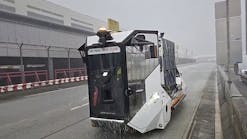How Cargo Demand Impacts GSE Needs
The industry has seen an opportunity for air cargo growth due in part to the COVID-19 pandemic’s influence on consumer purchasing habits.
Airlines and ground service providers have worked around the clock and have come up with creative solutions to overcome some cargo capacity challenges, according to Jason Gendron, president and CEO of Mercury GSE.
As a full-service GSE rental company, officials at Mercury GSE have had a unique view of cargo trends as they help supply the industry with the equipment needed to help meet current demands.
Gendron recalled the pandemic beginning in March 2020 and seeing air traffic come to stop.
“Everyone was trying to scramble to figure out what this meant and how it was going to affect GSE,” he said. “We were afraid a lot of our equipment would come back. We did not know what it meant for us.”
While passenger traffic all but ceased, the demand for cargo picked up quickly over the next months, and airlines shifted their focus.
Officials at Mercury GSE also saw an increased demand for GSE to service MROs that were parking airplanes and commissioning passenger aircraft to carry cargo – nicknamed “preighters.”
“In the very beginning, a lot of our equipment shifted and pivoted from airfield operations or cargo operations to conversion and maintenance operations, servicing airplanes on the ground,” Gendron said.
During preighter conversions, aircraft doors were widened in many cases to allow either lower deck or main deck cargo loaders to service the aircraft. However, certain cases required ground handlers to be more creative with GSE solutions.
“In some cases, on lower decks, we saw belt-loaders being used. We saw an increased demand for belt-loaders, where they would normally be loading baggage and now they’re loading packages,” Gendron said. “So, they would put somebody inside the airplane and put packages individually on those belt-loaders and then palletize them in the lower deck of the aircraft.
The Existing GSE Fleet
Beyond unique examples like preighters, airlines and ground handlers have been tasked with meeting cargo demands with traditional cargo aircraft and GSE.
From his company’s perspective, Gendron said the current fleet of cargo handling equipment in the field is keeping up with the workload. However, the increase in use is having an effect.
“Based on the data that we see, we’re having to maintenance more frequently than we would in the past to keep up with the demand. So that tells me that they’re running this equipment a lot more than it has been in the past,” Gendron said.
In addition to running more flights, Mercury GSE officials are also seeing examples of ground handlers sharing equipment given the extraordinary demand for cargo.
“We like to try to avoid that when possible, but we’ve noticed that people are more willing to share their resources,” Gendron said.
While these “loose pooling arrangements” may be solving a practical issue, this additional use is also leading to more preventative maintenance and required repairs.
The labor shortage is impacting maintenance and repair needs, too.
“There’s less experience across the board. There’s a lot of turnover on the ramp. I think training is a big factor there,” Gendron said. “We’re seeing more maintenance, more break-fix – things that are caused by possible mistakes on the ramp.
“A lot of times at Mercury, we’ll make modifications to avoid that on the equipment that we’ve bought. That’s done in conjunction with the manufacturer based on high use,” Gendron added.
Along with labor challenges, the ground support industry is not immune to supply chain issues. When repairs are needed, Gendron said his company is dealing with the same supply chain issues that manufacturers face.
“We’ve instructed our parts guys, ‘If you can find it, order it,’” Gendron said, noting in many cases parts are available but timing when those components will arrive has been suspect.
Parts availability is impacting new equipment orders too.
“For equipment that we have purchased, across the board, those purchases have been delayed because of the supply chain. That’s both with us as a rental and leasing company and ground handlers who are trying to buy,” Gendron said
“It seems to be hit-or-miss. It’s not one specific item that’s a problem,” he continued. “We know that the manufacturers are all busy and they’re all quoting lead times that are longer than we’ve ever seen in this industry.
“I think that’s going to last for a couple of years, so you have to plan way ahead.”
With less new equipment available, Gendron said more requests for rebuilt and refurbished equipment are being received. Used equipment also helps with budgeting challenges.
“We see the trend of budgets for ground equipment for the airlines being constrained for the near future based on an operating expense is more palatable than capital expense. Mercury can provide an operating expense piece of equipment that includes maintenance,” Gendron said.
Temporary Measures vs Permanent Changes
Prior to the pandemic, commercial aviation was experiencing large growth – from both a passenger and cargo perspective. That growth was driving demand for GSE. And while the pandemic set things back, the airlines’ return to pre-pandemic levels should continue to fuel GSE demand.
As GSE availability catches up to demand, Gendron said he expects temporary measures like lending equipment to other ground handlers will wain while other trends like outsourcing GSE maintenance may gain momentum.
“I think trends in the future are going to lean toward full-maintenance and ‘How can you give me an operating expense and reduce my reliance on personnel, reduce my reliance on maintenance staff?’
“The cargo companies want to move cargo from A to B. They don’t make any money owning ground support equipment,” he added.
Gendron added GSE pooling projects, like those carried out at Luton Airport and Hong Kong International Airport, could gain popularity as handlers look to manage GSE expenses and meet environmental initiatives.
“I think the other trend that is going to emerge from this is pooling,” Gendron said. “LAX attempted to do a pooling arrangement for Tom Bradley Terminal, back before the pandemic. That was sidelined because of the pandemic. But they realized having multiple sets (of GSE) with multiple handlers was just creating the Tower of Babel on the ground.
As for cargo demand, consumer behavior suggests current volumes will remain steady moving forward.
Jason Gendron is the CEO of Mercury GSE, an industry leader in ground support equipment. With more than 20 years of senior executive experience, he has an impeccable track record in the financial services and heavy equipment industries with deep expertise in leveraged finance, equipment management and asset management.






